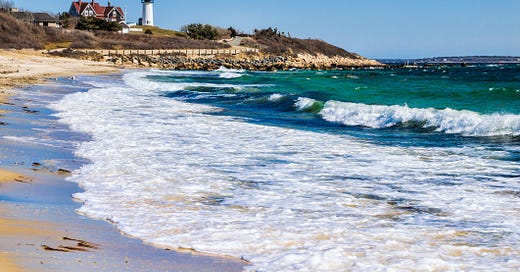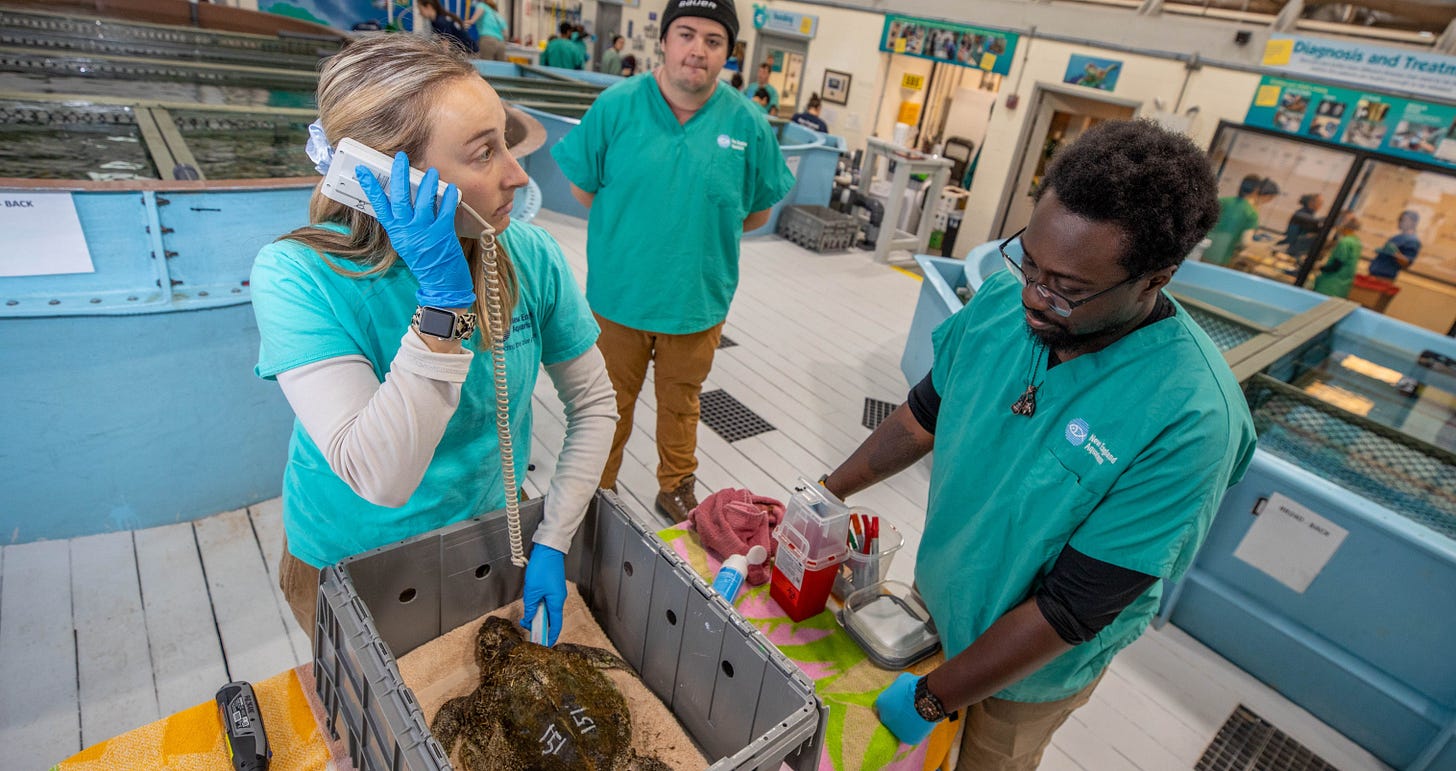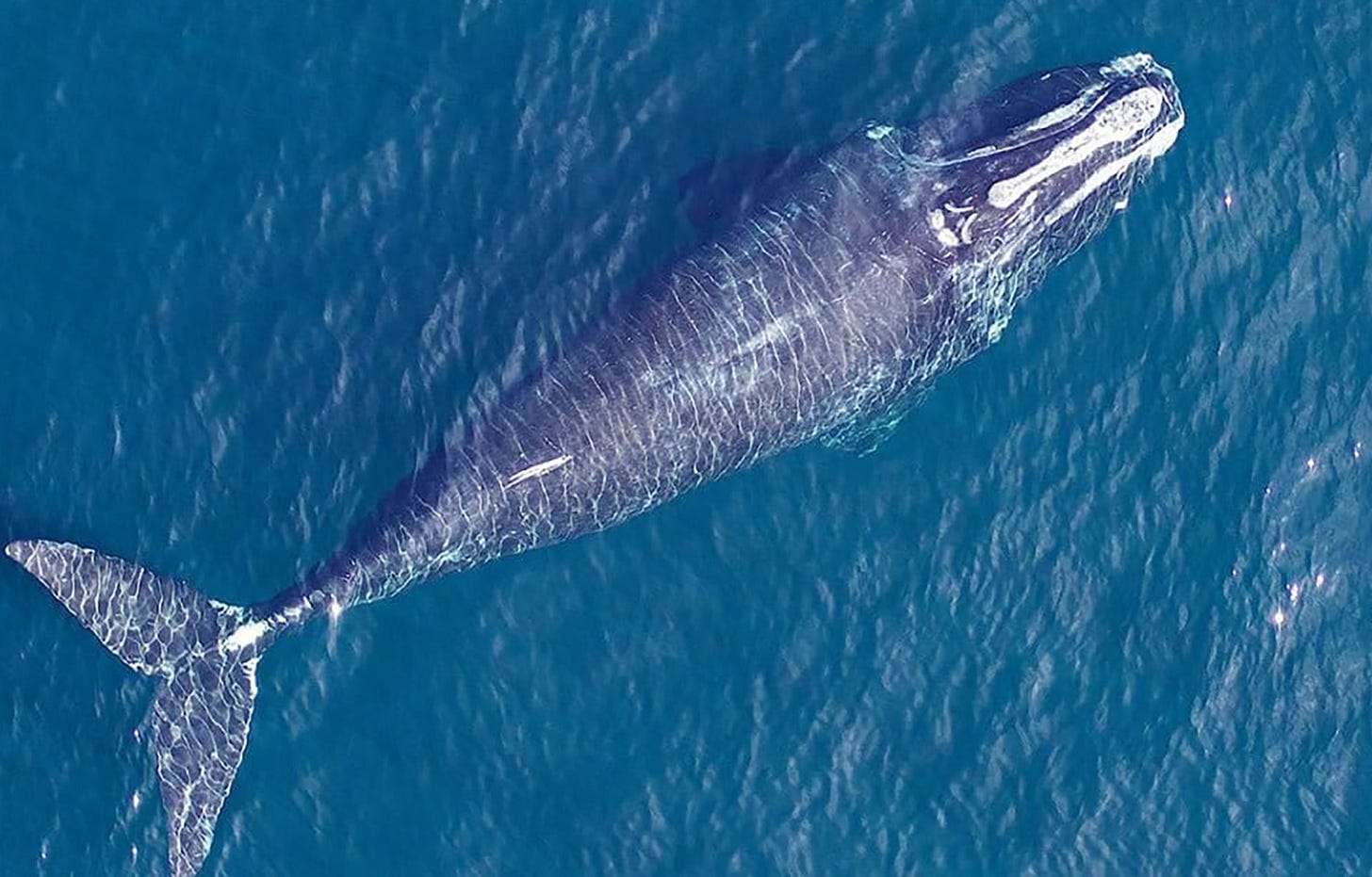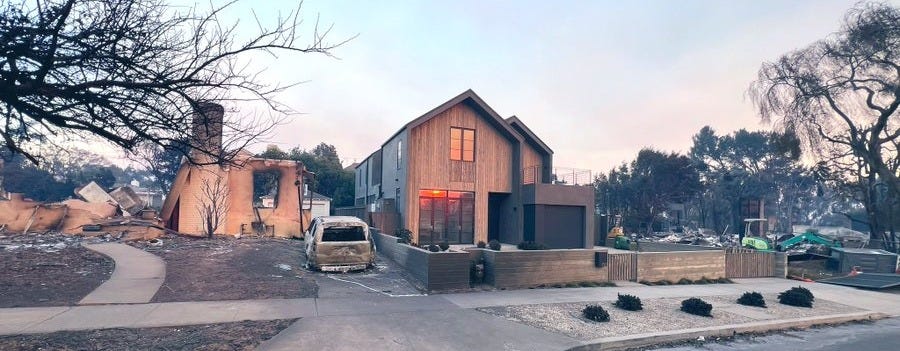Jan 17: Falmouth cuts costs & emissions; draft Trump Executive Order threatens offshore wind; Hear from Cape Bridges' Megaproject Leader
Also, stunned turtle season wraps up, (rare) good news from SCOTUS, and in Zanzibar they have "Solar Mamas"
NOTE: The table of contents items below are linked to the articles, but this feature only works if you are reading the post in Substack while logged in - apologies for the inconvenience.
In this week’s issue:
Cape & Islands
Falmouth — Making strides cutting emissions and costs: how they cracked the code
Mashpee — $2.8M grant secured to restore entire length of Mashpee River; “We’re ready to roll.”
Cape & Island Nonprofits & Research Institutes, Updates
Massachusetts
United States
Houses that made it through the LA fires — architects explain how
“Big Oil’s negligence”, some LA residents are calling on fossil fuel companies to pay for damages
International
Special event (virtual) — join Luisa Paiewonsky, leader of the Mass DOT’s new Office of Megaproject Delivery, for her first public discussion about the Cape Cod bridge replacement project. Hosted by Sierra Club Cape & Islands, Tuesday, Jan 21, 7 pm. Register HERE.
Cape & Islands
Falmouth — Making strides cutting emissions and costs: how they cracked the code
By Laura Parkin, Jan 17, 2025
Over the past fourteen months, the Town of Falmouth has started to put serious wins on the board, cutting both energy costs and greenhouse gas emissions.
There’s now a fast EV charger at the parking lot next to the library and several Level 2 chargers are in the works; walk-in fridges at the schools were upgraded, at no cost to the town, for a projected $9,000 in annual energy savings; Cape Light Compact, through Mass Save, covered $259,000 to convert Lawrence School’s light fixtures to high-efficiency LEDs; new solar panels are in place on the Hatchville Fire Station, and contracts are pending for two more arrays, one on the Water Treatment Plant and another at the Senior Center.
This progress stands in stark contrast to the situation just two and a half years ago: in 2022, the town was struggling to spend a $180,000 grant received from the state a year earlier for energy efficiency projects, and had missed the opportunity to apply for more funds, according to the Falmouth Energy Committee’s June 2022 Meeting Minutes.
What changed?
In September 2023, the town of Falmouth hired Stephanie Madsen, the former Sustainability Manager at the Woods Hole Oceanographic Institute, as their full time Sustainability Specialist. Falmouth is only the second of the fifteen Cape Cod towns to employ a full time sustainability officer; Barnstable hired Seth Hogan as their Sustainability Manager in November of 2022. Truro is in the process of hiring a full time Climate Change Coordinator.
The hire has paid off for Falmouth: not only are projects moving forward, but by cutting energy costs and bringing in grant funding, Madsen has already paid for her salary – seven times over, she said in an interview.
Adding new work – but not new staff or expertise
In hindsight, hiring a Sustainability Officer may seem obvious, but most Cape towns, while they have voted to adopt Massachusetts’s net zero by 2050 emissions target, have not added personnel to take on the additional work. “Everyone is overworked, and everywhere is understaffed. People are busy at Town Hall,” said Madsen.
In Falmouth, it took a year of advocacy by a handful of determined residents to secure a vote at the April 2022 Town Meeting to add the position, followed by another vote in 2023 to have the salary included in the budget.
Finding solutions and hatching a plan
One of those residents, Rosemary Carey, had her “aha” moment during a webinar presentation by Jillian Wilson Martin, Natick’s Sustainability Officer in April, 2021.
“What struck me was her expertise. And then, the fact that there was an eight times ROI on her salary!” said Carey, who was a member of both the Falmouth Climate Action Network (FalCAN) and the Falmouth Energy Committee at the time.
That same April, Falmouth received its designation as a Massachusetts Green Community, which brings with it a commitment and funding opportunities to cut energy use by 20% over five years. Eleanor Ling, also a member of the Energy Committee and FalCAN, grew concerned.
"It’s not just that the town didn’t have manpower, it’s that this is a special area of expertise, and no one on the staff had been hired to do this job. You need to know how to develop the right programs and what projects are needed,” said Ling. Her solution? “I talked to FalCAN – we have to petition for a Sustainability Director.”
Research and advocacy pay off
Carey, Ling and other members of FalCAN launched their campaign within days. First, members of FalCAN’s Steering Committee spoke to staff at more than ten Massachusetts towns, gathering information on everything from salary ranges to job descriptions for their Sustainability Officers.
No two towns are identical, but themes emerged. "Very early on it struck me that this person has to be in the Town Manager office. The Town Manager has oversight over all the departments,” said Ling.
Information in hand, the group wrote the Article for the vote at Town Meeting. Then they poured their energy into building support for their petition: they presented to the Select Board, seeking their advice; spoke to friends, family, and colleagues; reached out to other town committees; wrote and solicited letters to the editor of the local paper; and even developed a script for their calls to neighbors. In their conversations, they emphasized the economic benefits this position would bring to the town. “Money is the convincing argument,” said Carey, “everything else is ‘feel good’.”
At Falmouth’s Town Meeting one year after they started their work, the position was approved by the voters.
Has the position worked out as they had hoped?
“Oh, yes! Oh my gosh, yes,” Carey said in response to a question of whether she feels the outcome has been positive.
“Stephanie has developed really good relationships and has a very good grasp of what’s going on and what the priorities and possibilities are in different departments,” said Ling. Madsen attends the Energy Committee meetings, sharing her insights, which helps the Energy Committee members understand the town’s priorities and direct their efforts more effectively, according to Ling.
“The committee does not direct, oversee, or supervise Stephanie,” said Ling, but the committee, in addition to benefiting from Madsen’s input, has collaborated with her to run community events, including a presentation on Community Solar.
What’s next for Falmouth?
“As a Green Community, we made a commitment to lower our energy use by 20% by April, 2026. Falmouth has managed to reduce energy use by 10% so far,” said Madsen.
She plans to continue to analyze energy usage and other data to identify and prioritize projects, applying for grants to cover the costs as much as possible. Her initial focus will be on energy efficiency, and then she will look to electrify municipal operations, by replacing fossil fuel heat systems in town buildings with heat pumps, and supporting the town’s transition to electric vehicles, according to the November 13, 2024 Energy Committee Minutes.
“There’s a lot more to be done,” said Madsen.
Wellfleet — Stunned Turtle Season Wrapped; New England Aquarium Treats Record Numbers
“Stunned turtle season was officially called on January 6, with the last turtle admitted to the Aquarium’s Sea Turtle Hospital on January 3,” wrote Pam Snyder, Director, Marketing and Communications at the New England Aquarium, in response to emailed questions.
The aquarium treated 518 turtles this season, and as of January 15, 82 turtles remained at the hospital: 54 Kemps ridley, 7 greens, and 21 loggerheads. Throughout the season, to make room for new arrivals that needed care, the aquarium transfered 375 turtles to 12 facilities all over the country, from Pittsburg to Texas, according to Snyder.
“We had fewer facilities to send to this year due to the hurricanes in Florida and other factors. At one point, there were 315 turtles receiving care at the Aquarium’s Sea Turtle Hospital, which was a record for the Aquarium. This year, we will be fully rehabilitating more turtles than we typically do: closer to 80 rather than 60.”
As waters have warmed as a result of climate change, turtles stay North longer, and end up at greater risk of being caught, particularly in the Cape’s “hook”, and stunned, when cold weather and colder water arrive.
“Ten years ago, the average year yielded under 100 live sea turtles being rescued and treated. Over the last several years, that number has grown to hundreds of sea turtles,” according to Snyder.
Stranded turtles are usually rescued by staff and trained volunteers with Mass Audubon’s Wellfleet Bay Wildlife Sanctuary who walk the beaches during the stranding season.
So far, Snyder is aware of only one turtle having been released back to the wild — a green sea turtle in North Carolina. But there may have been others, “We do not always get up to date info on this,” she wrote.

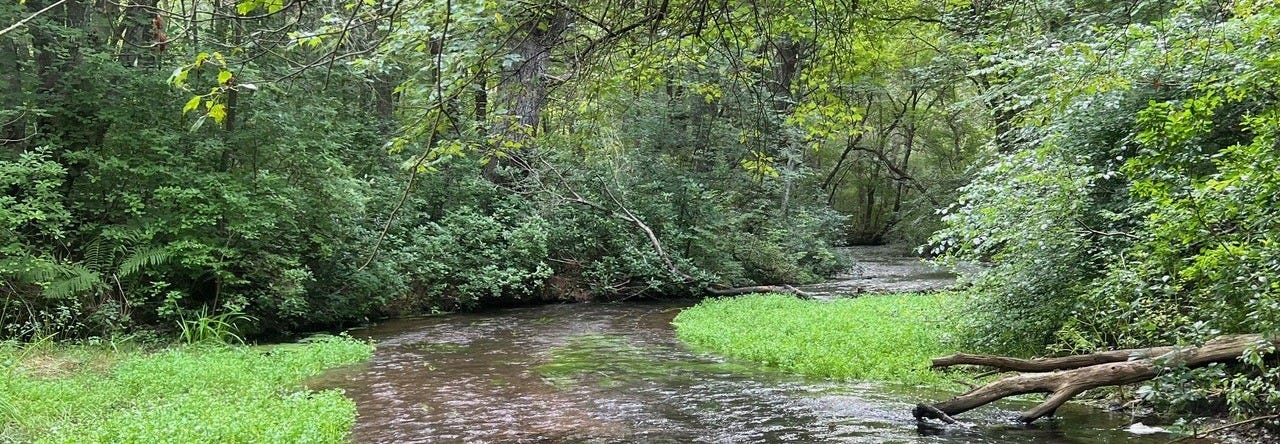
Mashpee — $2.8M Federal Grant to Restore the Mashpee River
Association to Preserve Cape Cod (APCC) on January 8 announced a $2.8M federal grant “to restore habitat and improve fish passage along the entire five-mile length of the Mashpee River, from its source at Mashpee-Wakeby Pond to Popponesset Bay,” according to APCC’s written statement.
It was a successful dash to the finish line: APCC and its partners aimed to get the grant under contract before the change in the federal administration. “We are now under contract and should be fairly insulated from claw back,” wrote Andrew Gottlieb, APCC Executive Director, in response to questions.
“This project represents a significant step towards preserving the health and vitality of the Mashpee River. By working closely with the Mashpee Wampanoag Tribe, the town of Mashpee, and other partners, we can ensure that this restoration effort honors the cultural and ecological significance of this river,” Gottlieb said in APCC’s statement.
Looking ahead, Gottlieb wrote, “It [the project] has been well conceived and we are ready to roll.”
Cape & Island Nonprofits and Research Institutions, Updates
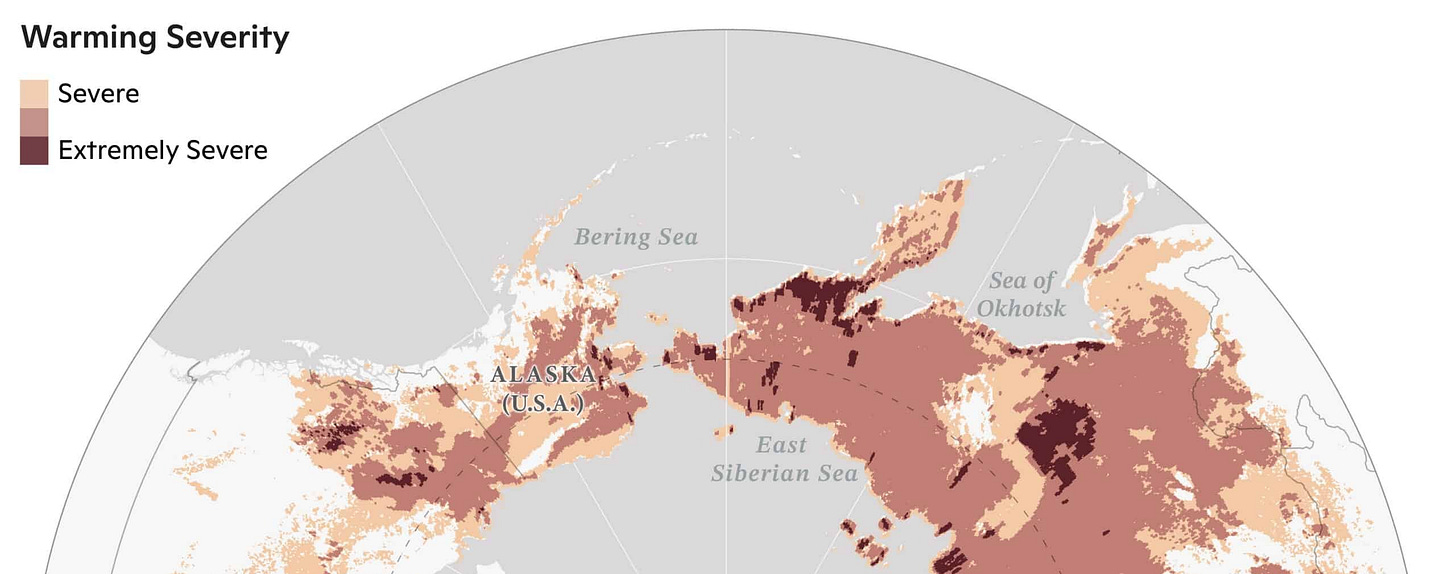
Woodwell Climate Research Center - Arctic hotspots study reveals areas of climate stress in Northern Alaska, Siberia
Update by Kate Petersen, Jan 16, 2025
Ecological warning lights have blinked on across the Arctic over the last 40 years, according to new research, and many of the fastest-changing areas are clustered in Siberia, the Canadian Northwest Territories, and Alaska. The analysis of the rapidly warming Arctic-boreal region, published in Geophysical Research Letters this week, provides a zoomed-in picture of ecosystems experiencing some of the fastest and most extreme climate changes on Earth. Full story.
Massachusetts
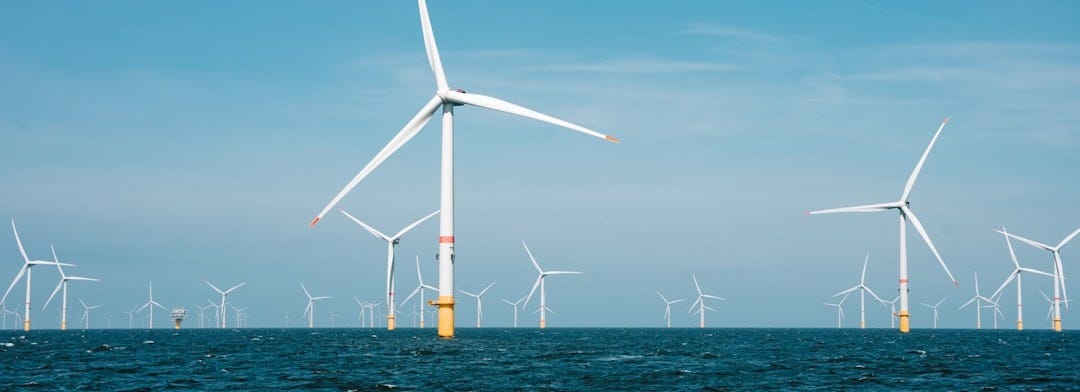
The Draft Order that Offshore Wind Opponents Sent to Trump
Heatmap News, by Jael Holzman, Jan 15, 2025
Major groups in the anti-offshore wind movement are going big, submitting a lengthy policy wish list to the Trump transition team, according to documents obtained and first reported by Heatmap News.
Key organizations in the movement against offshore wind submitted a draft executive order “on the suspension of offshore wind development” to the transition team. According to the draft, not only are activists asking for a pause on new permits for offshore wind, but also for a stop-work order on all projects currently under construction. They’re also asking for the Health and Human Services Department to become a weapon against the growth of renewable energy, requesting studies into the health and environmental effects of wind turbines and transmission cables. Full story.
According to the Associated Press, President-elect Donald Trump tasked New Jersey Congressman Van Drew a vocal critic of offshore wind with writing an executive order he could issue to halt wind energy projects. Full story.
Massachusetts Counting Heavily on Offshore Wind to Meet Climate Targets
According to the Massachusetts Clean Energy Center’s website, “Offshore wind will become the largest source of clean energy for Massachusetts, making more electricity available with lower emissions.”
Radioactive water appeal to begin: Will state block Pilgrim from sending water into Cape Cod Bay?
CAI, by Jennette Barnes, Jan 14, 2025
A state appeal over the proposed discharge of radioactive water from the Pilgrim Nuclear Power Station is about to get underway…The owner of Pilgrim, Holtec International, is challenging the state’s denial of a permit modification the company would need to release the radioactive water into Cape Cod Bay. Full story. ⏺️Listen here.
United States
Supreme Court Lets Honolulu Lawsuit Against Oil And Gas Companies Proceed
The companies had appealed to the Supreme Court in an effort to get the case moved to federal court, where they’ve successfully had suits tossed out.
Associated Press, by Lindsay Whitehurst, Jan 13, 2025
The Supreme Court said Monday it won’t hear an appeal from oil and gas companies trying to block lawsuits seeking to hold the industry liable for billions of dollars in damage linked to climate change…
The industry has faced a series of cases alleging it deceived the public about how fossil fuels contribute to climate change. Governments in states including California, Colorado and New Jersey are seeking billions of dollars in damages from things like wildfires, rising sea levels and severe storms. The lawsuits come during a wave of legal actions in the U.S. and worldwide seeking to leverage action on climate change through the courts. Full story.
Biden administration withdraws rules to save endangered whales from collisions
Associated Press, By Patrick Whittle, Jan 15, 2025
The federal government is withdrawing a proposal that would require more ships to slow down in East Coast waters to try to save a vanishing species of whale, officials said Wednesday…federal authorities said there’s no way to implement the rules before President-elect Donald Trump takes office on Monday. Full story.
Millions spent to oppose the new rules
I’ve been reporting for 2 years on a proposed federal rule to slow boats in order te save the critically endangered right whale. Republicans and boating lobbyists spent millions to block the rule by running ads, overwhelming NOAA and running down the clock. It worked.” posted Clare Fieseler, PhD on Bluesky, @clarefieseler.bsky.social.
New England Aquarium Responds
Formal withdrawal of the much-needed vessel speed rule is a serious setback for the critically endangered North Atlantic right whale.
The modifications to the existing vessel speed rule were proposed more than two years ago. Since then, there have been at least four deaths and five injuries due to vessel strikes in U.S. waters, exacerbating the ongoing Unusual Mortality Event since 2017, according to a statement by the New England Aquarium.
The proposed changes
The changes would broaden the spatial boundaries and timing of seasonal speed restriction areas along the U.S. East Coast. They would also expand mandatory speed restrictions of 10 knots or less to include most vessels 35–65 feet in length, from the NOAA Fisheries website.
Reasons given by the opposition?
The legislators claim that the changes are a major disincentive to boating and fishing and “pose economic harm,” reported SeafoodSource.com.
L.A. Fires Show the Reality of Living in a World with 1.5°C of Warming
Time, by Jeffrey Kluger, Jan 10, 2025
Here is the reality: The very metabolism of the Earth has been thrown off by an atmosphere choking on greenhouse gasses, and it will take more than political bickering to set things right. Another reality: Fixing the problem first requires understanding—and, even more fundamentally, accepting—the science…
There is still time for aggressive climate action to lower emissions and bring temperatures to heel in the process. “Humanity is in charge of its own destiny…how we respond to the climate challenge should be based on evidence,” said Carlo Buontempo, director of Copernicus’s European Center for Medium-Range Weather Forecasts. “The future is in our hands. Swift and decisive action can still alter the trajectory of our future climate.” Full story.
These Homes Withstood the LA Fires. Architects Explain Why
In Pacific Palisades and Malibu, some houses with fire-resistant designs remained standing amid neighborhoods of destruction.
Bloomberg, by Kriston Capps, Jan 13, 2025
More than 12,000 structures have been consumed by the wildfires raging across Los Angeles this week, many of them single-family homes that have stood for decades.
A brand-new house in Pacific Palisades designed and built by architect Greg Chasen in summer 2024 could have easily been one of them. None of the other homes around it survived, and a car parked out front by a neighbor was the perfect vector to spread the flames.
Yet on Jan. 9, after a night of devastation, Chasen found the house intact, barely touched by the fire. A photo of the house posted by the Malibu architect went viral on X, and a thread on Reddit swelled with guesses about what saved it. Full story.
‘Big oil’s negligence’: LA residents call on fossil fuel industry to pay for wildfire damages
The Guardian, By Dharna Noor, Jan 16, 2025
As Los Angeles’s deadly wildfires continue to burn, a group of survivors is taking aim at the industry most responsible for fueling climate disasters: fossil fuels.
During a Thursday conference call, residents impacted by the blazes lamented losing their homes and communities and called for litigation and policies that could force big oil to pay for the damages. In the coming days, lawmakers will introduce legislation with that aim in mind.
On Thursday, climate activists with youth-led group the Sunrise Movement held a protest at an oil facility owned by Phillips 66 calling for industry accountability.
“Fossil fuel CEOs are responsible for the destruction that is happening right now in Los Angeles,” said Simon Aron, an 18-year-old protester, said. Full story.
International
‘Solar Mamas empower our people by giving them electricity’: the women lighting up Zanzibar
The Guardian, by Carlos Mureithi in Unguja, Jan 15, 2025
In a dimly lit corridor of a mud-walled house nestled among coconut trees, Sharifa Hussein stripped red and black cables, a screwdriver voltage tester balanced between her lips and rolls of cable lying by her feet.
Then, with the help of three other women, she attached the two wires to an electronic device nailed on the wall.
The women, all dressed in colourful hijabs, were installing solar power to a house in Muyuni B village in Unguja, the main island in the semiautonomous archipelago of Zanzibar, which lies off the coast of Tanzania in east Africa.
They are part of a larger group – known fondly as Solar Mamas – who assemble, install, repair and maintain solar power kits in villages across the archipelago. They receive training from a community-based organisation called Barefoot College Zanzibar. Full story.
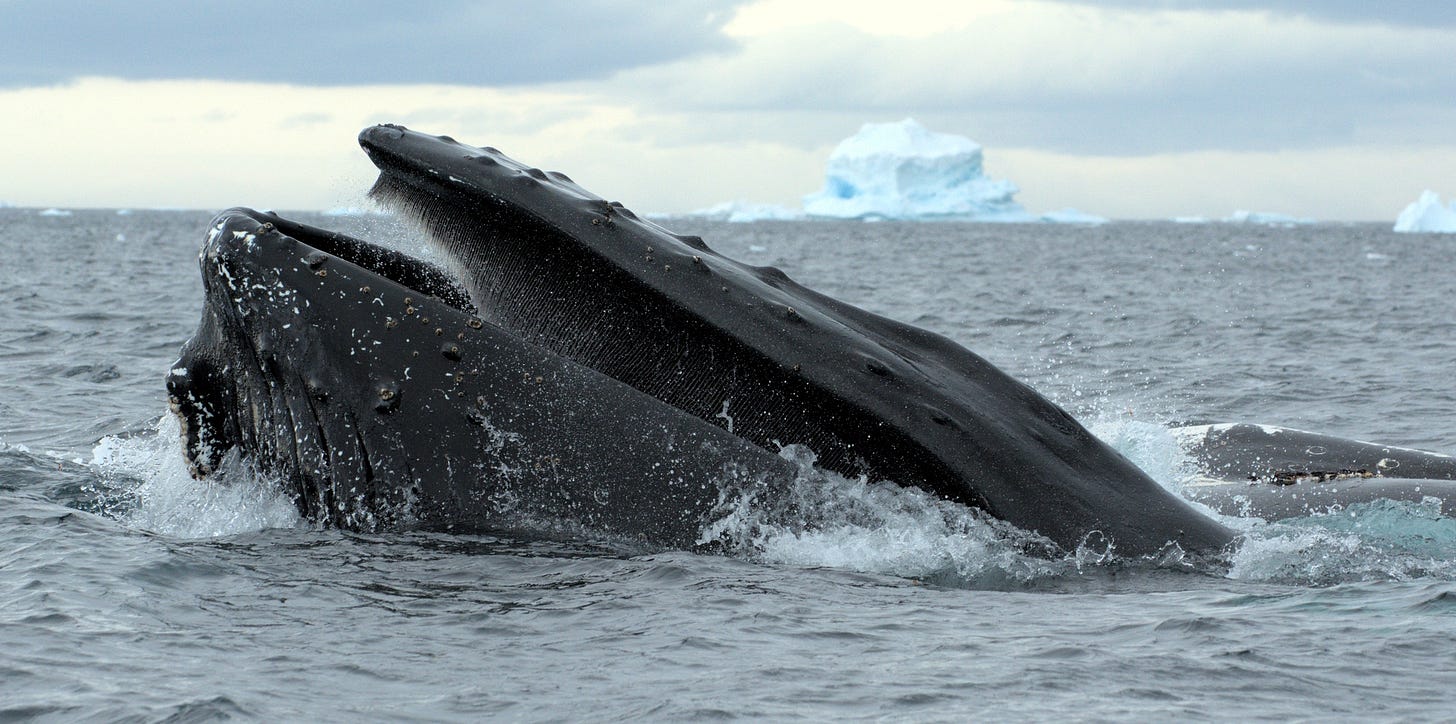
Scientists Call for More Marine Protected Areas in the Southern Ocean
As climate change and commercial fishing threaten krill, the crustaceans that fuel Antarctica’s entire food web, scientists and advocates say those responsible for protecting Antarctica’s marine life are failing.
Inside Climate News, by Teresa Tomassoni, Jan 11, 2025
When Antarctic krill swarm, the semi-transparent shrimp-like crustaceans join together in the millions or trillions, forming dense coral-colored underwater clouds as they swim in sync with one another and traverse frigid ocean currents. Some of these swarms are so large they can be seen from space, extending for miles near the ocean’s surface and hundreds of feet below, attracting predators from land, sea and sky…
Individually, each of these animals is only about two inches long, but collectively they form one of the largest biomasses on the planet. They also fuel the entire food web in the Southern Ocean, which circles Earth’s southernmost continent. “Every single species in Antarctica feeds on krill, or something that feeds on krill,” said Rodolfo Werner, a marine biologist from Argentina who has been studying marine ecosystems in Antarctica for more than 20 years…
But the crustacean’s future, and that of its predators, by extension, are increasingly in jeopardy due to climate change and a growing commercial krill fishery. Full story.
Brazil approves new law to promote offshore wind development
Enerdata, Daily Energy and Climate News, 14 Jan, 2025
The Brazilian government has signed into law the bill authorising offshore wind projects. The law provides incentives for the development offshore energy projects within Brazilian territorial waters, provides guidelines for projects, restoration of explored areas and requires prior consultations with affected community to ensure "respect" for traditional maritime practices. The law also prohibits offshore wind installations in in shipping lanes, sites of military activities, and areas listed as cultural and natural heritage.
Brazil targets a share of 45-50% of renewables in its energy mix for 2030 and a 53% cut in GHG emissions in 2030 compared to 2005. Story.
Upcoming Events and Webinars
Jan 21, Virtual — Sierra Club Cape & Islands, Cape Cod Bridges Project, First Public Discussion with Megaproject Leader
Sierra Cape Cod’s 2025 “3rd Tuesday Talk” series begins January 21st at 7pm featuring Luisa Paiewonsky, leader of the Massachusetts Department of Transportation’s new Office of Megaproject Delivery, addressing the environmental and equity impacts of the Cape Cod Bridges Program.
This Zoom event is open to all; time will be reserved for audience Q&A.
📅Tuesday, Jan 21, 7:00 to 8:00 pm 🗺️📌 Virtual. Register HERE.
Jan 22, In Person — Center for Coastal Studies, Napi’s Lecture Series: Author Dennis Minksy
Author Dennis Minsky will deliver a talk about his latest book for the first of the season’s Napi’s Lectures. More information HERE. Registration not required. Free.
📅Wednesday, Jan 22, 5:00 - 6:30 pm 🗺️📌 Center for Coastal Studies Hiebert Marine Laboratory, 5 Holway Avenue, Provincetown, MA
Feb 4, Virtual — Woodwell Climate Research Center, Our Climate Future: Fact + Fiction
How do we create a rich, nuanced vision of our climate future that can motivate and guide climate action today? This virtual event brings together a diverse panel of experts to explore the relative strengths of science and science fiction—and the potential synergies between the two—in understanding what the future might look like. Information and registration HERE. Free.
📅Feb 4, 1:30-2:30 pm 🗺️📌Virtual
Upcoming Activities
Jan 18, In Falmouth — Styrofoam Recycling
Falmouth is holding another Styrofoam recycling event on January 18, following its successful first collection of Expanded Polystyrene Foam (EPS) on November 23. See the website for information on what items will be accepted.
📅Saturday, Jan 18, 9:00 - 12:00 pm 🗺️📌416 Gifford Street, Falmouth
Jan 20, Provincetown — Center for Coastal Studies, MLK Service Cleanup and Trash Tally
9 - 11:30 am Shoreline cleanup at Race Point (or Head of the Meadow)
12 - 12:30 pm Lunch at Center for Coastal Studies sponsored by East End Market & Deli
1 - 4 pm Trash Tally at the Center.
More information and registration information HERE.
📅Monday, Jan 20, 9:00 - 4:00 pm 🗺️📌Please see registration info for location.
Additional Activities
Check out the calender HERE. Many events are free!
Powered by the “Communications Cohort,” co-led by the Barnstable Land Trust and APCC.

